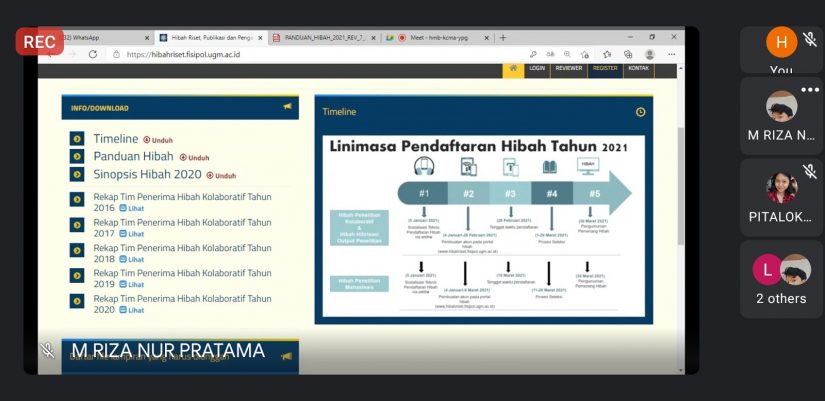
Maulida–familiarly called as Ifa–shared her experience from the beginning of organizing the proposal and reports, monitoring and evaluation, reports collection, to the preparation and the D-Day of PIMNAS. Ifa told the participants about the obstacles that she faced during those processes, starting from the tight deadline of the file collection, going through many revisions in the preparation of proposals and reports, to the conflicts with her team members.
Ifa said that teamwork is a hard thing, especially with the different activities of each member. She also admitted that during PKM preparation, especially in the normal condition (offline study), the academic process was left behind. But, Ifa emphasized that competition–including PKM and PIMNAS–can not be the reason for us to be lazy in studying. The students must actively catch up on the course materials on their own, one way is through asking friends.

As soon as there was an announcement of participants who have successfully passed to the PIMNAS stage, including Ifa and the team, the campus also provided continuous training in order to prepare the appearance of its contingents as best as possible. Almost every day, Ifa and the team undergo consolidation and presentation practice. Even when she was at the PIMNAS 32 location at that time, Bali, the consolidation and training still continued at the hotel.
After Ifa finished sharing her experiences and answering questions from the participants, the event was continued with a casual chat session. Riza asked the participants about their preparations for this PKM event, both regarding the supervisor, as well as the topics to be raised.
In this session, Riza made many comments on the topics that will be raised by the participants. He also provided inputs and suggestions on how to elaborate on these topics in the PKM proposal. In providing this input, Riza even showed the PKM proposal he had made while telling about the compilation process he was going through. Starting from making the discussion points, then from there it is developed into paragraphs in the proposal.
Not only that, the participants also shared their complaints and concerns, while occasionally asking for recommendations and suggestions from the speakers. Of course, the speakers of the Bedah PKM Humaniora program responded well and provided suggestions if they were relevant to the problems of the participants.
